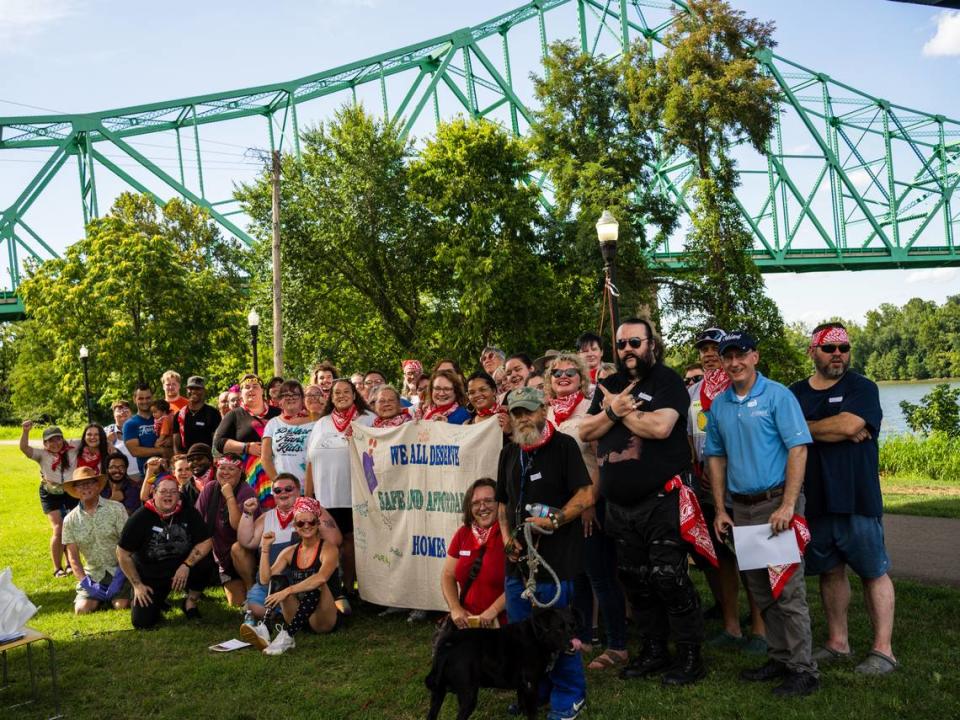Pine Mountain fracas shows rural Kentuckians must fight for each other, not against | Opinion
I am a proud working class Appalachian woman raised on a small tobacco farm in rural Eastern Kentuckian. I come from a community where we had each other’s backs. If someone was sick, or if there was a death in the family, we made each other casseroles, or offered to watch each other’s kids to lighten the load. We took turns working in each other’s tobacco fields or vegetable gardens. We never knew a stranger and no one went hungry if we could help it. It’s these kinds of values that informs my work as the Director of Appalachian People’s Union at Showing Up for Racial Justice (SURJ) — to bring our Appalachian communities together to fight for a better future where everyone, no matter our skin tone, our zip code, or if we have any money in our pocket — can live a decent life.
Unfortunately, there are some in our state who don’t share these values and actively oppose them. I was upset to learn that last week, a gathering of The Appalachian Waymakers Collective, a democratically controlled, multiracial, multicultural locally based grantmaker supporting artists and art makers throughout Appalachia, was attacked by a group of white men and women who told them they were not welcome in Harlan County and wanted them to remove their items, items they deemed “non-Christian”, from a chapel where the land stewards had given them permission to be. Unfortunately, this act of intimidation of people who aren’t white or heterosexual has been increasingly visible across our state. A few months ago, members of the Klu Klux Klan left recruitment flyers in multiple rural Kentucky towns. The Kentucky state legislature has passed some of the harshest anti-LGBTQ legislation in the country. These three events are attempts to intimidate people of color, LGBTQ people, and people of conscience. They are sowing divisions around race and gender, so a small few can feel powerful and get richer while the rest of us shrink, hide, or try to leave.
But I know these hateful people are the minority in this beautiful state. There’s a much richer story I want to tell about the masses of us Appalachians who are choosing to fight for Kentucky in the tradition of our ancestors who have fought alongside each other, white, Black and brown, so that all of us could have a life of dignity.
Last month, after knocking 1,750 doors and engaging hundreds in community meetings, a multiracial, multigenerational group of 75 Eastern Kentuckians, members of The Kentucky People’s Union (KPU), gathered in Ashland, donning red bandannas to officially launch their housing campaign fighting for a tenants bill of rights. The Kentucky People’s Union has adopted the red bandanna as a symbol of unbreakable solidarity in the legacy of the “redneck army” of miners who fought in the Battle of Blair Mountain in West Virginia in 1921, the largest labor uprising in this nation’s history. The miners were called “rednecks” because of the red bandannas they wore around their necks. KPU members are part of a long Kentucky legacy of proud, powerful organizers who know that working people should be united, not divided. That’s why they are also fighting for trans rights and racial justice issues alongside fellow community groups Ashland Pride and Ashland for Change. This organizing is in the legacy of the original Fairness Campaign in Louisville that won a LGBTQ civil rights legislation in 1999 after a 15-year campaign. By centering anti-racism, building their base of members, and refusing to stay small, they won trans rights before even New York City and Chicago.

My organization Showing Up for Racial Justice (SURJ) is inspired by Anne Braden, a white Southerner who dedicated her life to organizing Southern white people into multiracial movements for justice. Anne and her husband Carl were journalists when they, a white couple, purchased a house in the Louisville suburb of Shively in order to sell it to a Black man, Andrew Wade. After the sale, the Wade family was harassed by white supremacists and their home was bombed. The Bradens were put on trial for sedition amid charges of a Communist conspiracy, and Carl served time, but they never let it deter their work.
All of us in Appalachia must honor the Harlan County miners and their families who bravely organized and fought for their right to unionize in the 1930s Harlan County Mine Wars, some of the most violent labor clashes in this country referred to as “Bloody Harlan.” And later, the miners in the Harlan County Brookside Strike captured in the documentary “Harlan County USA.” These miners came across race and gender to fight together as a union and it’s upon us to continue in their legacy.
Today, rural Kentuckians — and all Kentuckians — must not let our opponents divide us, but instead choose to fight for each other.

Beth Howard is the Appalachia People’s Union Director for Showing Up for Racial Justice and lives in Lexington.
